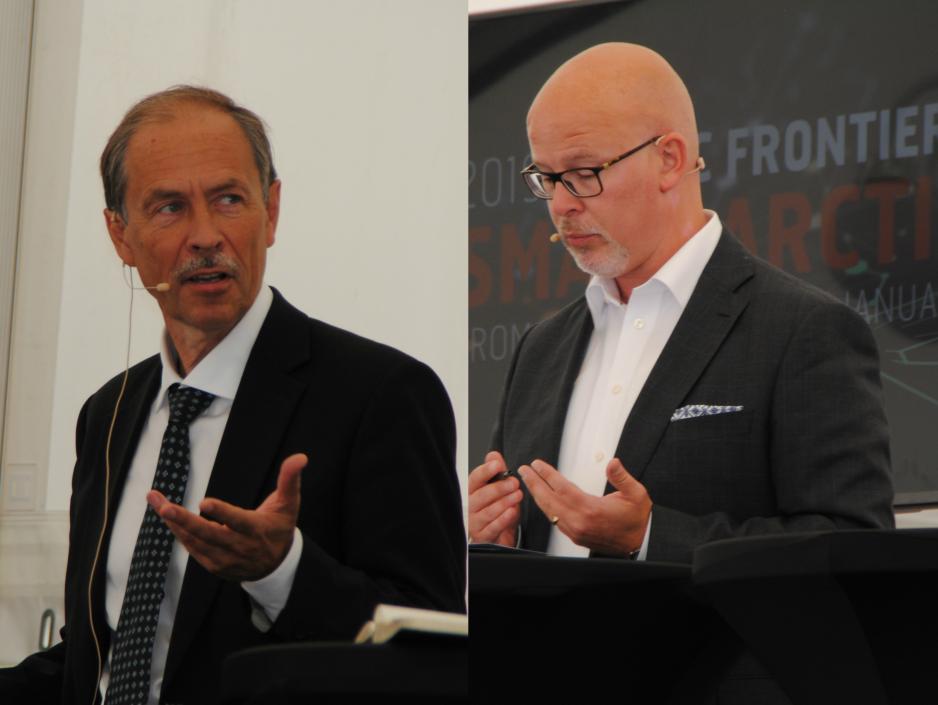A Ritual Gust of Cold War

An aura of cold war rituals hovered over the exchange of opinions between Norway and Russia during the High North debate during the Arendal Week.
Vladimir Isupov, advisor at the Russian Embassy in Oslo, painted what he referred to as dark clouds over a historically long and good neighbourly relation between Norway and Russia.
Dark clouds between the countries
- The dark clouds came in 2014, when Norway introduced sanctions against Russia, a neighbour with whom there was never an armed conflict, a neighbmour that boasts a long and shared history with Norway in the Arctic.
We see hostile actions near the Russian border and we see Norway stationing American troops on Norwegian soil, contrary to Norway's declared defence policy, Isupov said during the debate about 'The Locomotives of the Arctic' in Arendal last week.
Vladimir Isupov emphasised that Russia wants and works to promote continued co-existence in the High North, however, he also expressed that this cannot be guaranteed for all future.
- Who is Norway building forces against?
Isupov said: - We hear that Norway does not consider Russia a threat while at the same time you build up a provocative military force against Russia near the border. And if Russia is not a threat, then against whom is this force built, he asked, while also repeating the hope about continued peaceful co-existence in the Arctic.
Audun Halvorsen, State Secretary of the Norwegian Ministry of Foreign Affairs, repeated what has been the Norwegian point of view throughout the sanction policies against Russia.
- We carry understanding and respect for Russia's long and proud Arctic tradition, and we work continually to promote peaceful co-existence and close cooperation in the High North.
- Russia violated public international law
However, what happened in 2014 was that Russia violated public international law through its annexation of the Crimea. The international society had to respond. The sanctions are not a result of the bilateral relationship between Russia and Norway, but rather of Russia's violation of public international law.
Norway has always had foreign forces exercising on its territory, and only a few decades ago they were fare more than they are today. The troops Isupov refers to are stationed at Værnes near Trondheim, a long way from the Russian border, Halvorsen emphasized.
The MFA State Secretary also pointed out that the exercise areas in Troms County are far from the Russian border and refuted all hints about Norwegian aggression towards its eastern neighbour.
- What is carried out today is part of a historically long and predictable line in Norwegian security and defense policy and it does not change our work to promote a peaceful Arctic, Halvorsen said.
Important issues and widespread agreement
Other participants in the debate were the Danish Ambassador to Norway, Jarl Frijs-Madsen; the head of the International Arctic Centre of the Canadian Embassy to Norway, Bob Paquin; as well as Nordland County Councilor Tomas Norvoll.
They all supported the desire of and want to work to promote peaceful development in the north. The increased attention towards the High North is largely due to the unexploited resources of the Arctic as well as to the significant cilmate challenges in this region of the world.
Conflicts or conflicts of interest in the High North shall and must be solved through international legislagtion to which all the Arctic states have committed, among others through the Ilulissat Declaration, to which Frijs-Madsen was referring.
The people, the resources and the Arctic Council
Further development of the High North will depend on such development being sustainable, and also on infrastructure in the form of communication opportunities being constructed. The various indigenous peoples in the High North must also be taken into sufficient consideration.
The debate participants emphasised that the Arctic Council is and will remain a key body for cooperation, contact and exchange of information.
Russia's Vladimir Isupov also emphasised that the Arctic Council is the key international body for all Arctic politics.
And the Arctic locomotives? That has to be the people who live in the Arctic and the resources sustaining them, as well as those from which they are to live in the future.
Les artikkelen på norsk
